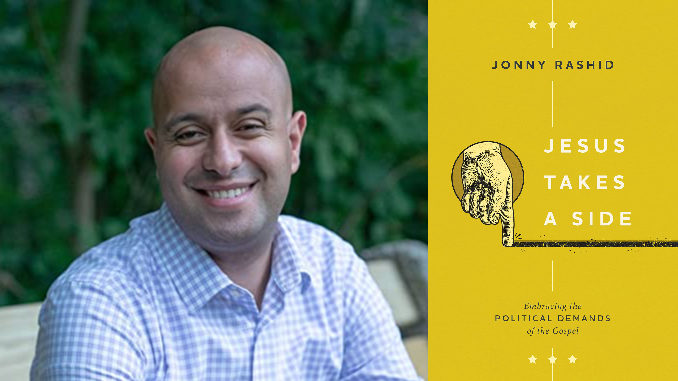
Podcast (beyond-the-page): Play in new window | Download
Subscribe: Apple Podcasts | RSS
It’s not normal for books that I read to be the subject of conversation before I read them. When I shared on social media that I was reading Jonny Rashid’s Jesus Takes a Side, reaction was swift. “Isn’t it amazing that Jesus is always on your side?” (Umm…not really, because if I truly thought Jesus was on the other side, I’d be changing camps to side with Jesus…something I’ve actually done a few different times in my faith journey.) In an increasingly polarized world, many Christians are calling for an end to politicization and for there to be a third way that unites both sides. Rashid takes exception to that, writing clearly about how Jesus never sacrificed care for the marginalized for the sake of unity. I recently caught up with Jonny to talk about Jesus Takes a Side.
The Conversation | Jonny Rashid
This excerpt may be edited for content or clarity. Listen to the full interview at the video or audio links above or wherever you get your podcasts.
Josh Olds: What do you mean when you say Jesus takes a side?
Jonny Rashid: I mean, Jesus takes the side of the oppressed and when it comes to making political commitments, we should align with uplifting and liberating the oppressed, and giving them as much a life and dignity as we can in our collective battle against death, which is what Jesus opposes. So where death exists, oppression exists; and where life flourishes, liberation exists, Jesus wants everybody to be liberated. And so we look at the least liberated and imagine Jesus working with them, relating to them, loving them.
Jesus takes the side of the oppressed and when it comes to making political commitments, we should align with uplifting and liberating the oppressed, and giving them as much a life and dignity as we can in our collective battle against death. – Jonny Rashid
Josh Olds: When I first got this book, it was the title that sold me on it, because it is so different than what we hear in a lot of Christian conversation. If you come out and you just say “Jesus takes a side,” then everyone sort of reacts against that. Do you feel like that there are people who are just like, “Hey, we shouldn’t take sides. We got to stay in the middle.” Or especially now, do you feel like people would read this and say, “You know, Jesus takes sides and that’s the conservative evangelical Republican side”?
Jonny Rashid: What we see in what was called the Moral Majority, what’s become the far right, we do see a lot of political commitments among those groups, but, they don’t really say they take a side, what they say is that they’re right. What they say is that God is on their side. What they say is, “We are in the right position,” as opposed to Jesus taking the side really meaning Jesus sides with the oppressed. So I don’t hear from the religious right, from the far right, that Jesus makes political commitments. Instead, what I hear is a sort of Christian supremacy, that this is the right way to do things. Not doing that is going to ruin our families, it’s going to destroy our kids, this is why we have to do it, they engage in a culture war in a different way than I am. Because what I’m talking about is actual explicit political commitments, as opposed to self-righteous ones, you know, ones that that protect me, my personal and religious interests, but rather ones that uplift the most vulnerable. So I do see a difference there. But I understand that a lot of people resist political commitments because they see the Republican Party being co-opted, or the Republican Party co-opting evangelicals…And so the instinct is to say, No, we’re not political, because being political is bad. In my viewpoint, it isn’t being political that’s wrong. It’s being allied with forces of deaths such as racism, such as homophobia, sexism, patriarchy, greed, environmental degradation. These are the things that are wrong, not politics.
The Book | Jesus Takes a Side
 Jesus sides with the oppressed. Will you?
Jesus sides with the oppressed. Will you?
In a world divided by left and right, red and blue, many Christians have upheld a “third way” approach in pursuit of moderation, harmony, and unity. But if Christians are more concerned with divisiveness than with faithfulness, we have failed to grasp the gospel’s political demands. We do not see Jesus taking a “third way” between oppressor and oppressed. And as followers of Jesus, neither should we.
For the sake of our faith, for the sake of the least of these among us, and for Christ’s sake, Christians need to stand firmly for truth, peace, and justice. In Jesus Takes a Side, author Jonny Rashid lays out the political demands of following Jesus and offers strategies for how to engage politics practically and prophetically—even if it means taking a side.
The Author | Jonny Rashid
 Jonny Rashid has served as pastor for Circle of Hope, an Anabaptist cell church, for over ten years. He is father to Elaine and Agatha, and married to Kristen. He lives on Lenape land, colonized as Philadelphia, in the northern part of the city. He moved to Philadelphia from Lebanon, PA, where his parents emigrated from Egypt. He is an abolitionist and a housing activist. He is an avid home cook (find him on Instagram @foodpastor) and a perpetually disappointed Philadelphia sports fan. He spends too much time on Twitter, blogs at jonnyrashid.com, and hosts Circle of Hope’s Resist and Restore podcast. He studied journalism, education, and history at Temple University and completed his Master of Divinity at Palmer Theological Seminary.
Jonny Rashid has served as pastor for Circle of Hope, an Anabaptist cell church, for over ten years. He is father to Elaine and Agatha, and married to Kristen. He lives on Lenape land, colonized as Philadelphia, in the northern part of the city. He moved to Philadelphia from Lebanon, PA, where his parents emigrated from Egypt. He is an abolitionist and a housing activist. He is an avid home cook (find him on Instagram @foodpastor) and a perpetually disappointed Philadelphia sports fan. He spends too much time on Twitter, blogs at jonnyrashid.com, and hosts Circle of Hope’s Resist and Restore podcast. He studied journalism, education, and history at Temple University and completed his Master of Divinity at Palmer Theological Seminary.
